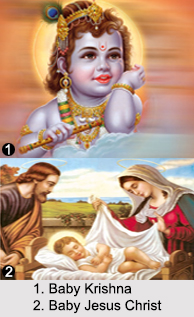 According to many European scholars, there are certain similarities between Christianity and Vaishnavism. Externally, it may not be traced but a closer look will reveal the similarities between the two of them. The concept of salvation is same in both Vaishnavism and Christianity; the similarities have been manifested even more clearly by the childhood of Krishna and by that of Christ. The similarities between the Vaishnavism and Christianity have been discussed below.
According to many European scholars, there are certain similarities between Christianity and Vaishnavism. Externally, it may not be traced but a closer look will reveal the similarities between the two of them. The concept of salvation is same in both Vaishnavism and Christianity; the similarities have been manifested even more clearly by the childhood of Krishna and by that of Christ. The similarities between the Vaishnavism and Christianity have been discussed below.
Childhood of Krishna and Christ
Similarities between Vaishnavism and Christianity have been traced out from the childhood phases of Krishna and Christ. They both have certain similarities in their childhood:
•Krishna as a baby was taken to Gokul and Christ carried to Egypt.
•St. John, the Baptist of supernatural birth, came as fore-runner of Christ and so did Bala Rama as the forerunner of Krishna.
Philosophical Similarity between Vaishnavism and Christianity
Vaishnavism and Christianity have a strange coincidence in between them in various stages of mysticism. There is an interchange of ideas between Asia and Europe in spiritual matters on this point:
•Both of the traditions accept a personal God- Krishna and Christ.
•Another similarity is both Vaishnavism and Christianity are based on the concept of love of God.
•Vaishnavism and teachings of Jesus Christ both put an emphasis on tolerance and humility.
•Both the traditions believe that one has to approach the God through his representatives; Christians believe Jesus Christ is the representative and in Vaishnavism the guru is one, but appears in many forms in order to attract the hearts of different souls.
•There is also the concept in Vaishnavism that an authorized "Aacharya" accepts a disciple with all his karma so that they can begin their spiritual life with a clean slate. This is similar to that of Christianity that Jesus will remove the sins of people when they accept him as their Lord and savior.
•Both Christianity and ISKCON are focused on spreading their message for the sake of other souls.
Difference between Vaishnavism and Christianity
Apart from the similarities, there are certain differences between the two traditions as well. One obvious difference between Christianity and Vaishnavism is the fact that the Christianity has a specific date of origin, while Vaishnavism claims to be eternal. Another difference is found between the concepts of incarnation and the idea that animals have souls; these are found in Vaishnavism.




















